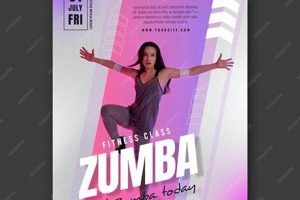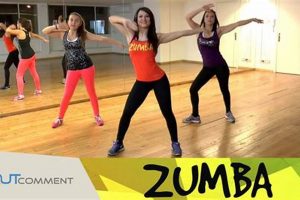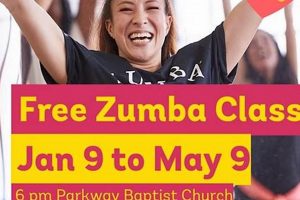Zumba sessions offered without cost within the Brooklyn area represent an accessible avenue for individuals seeking physical activity and dance-based fitness. These opportunities provide structured exercise programs, incorporating Latin-inspired rhythms and movements, led by certified instructors and made available to the public without requiring payment.
Participation in such fitness initiatives fosters community engagement, promotes physical well-being, and enhances cardiovascular health. Historically, subsidized or grant-funded programs have played a vital role in expanding access to health and wellness resources, especially within diverse urban environments, enabling a wider range of residents to benefit from exercise opportunities, regardless of their financial circumstances. This democratization of fitness options contributes to a healthier and more connected community.
The subsequent sections will explore specific locations and schedules, necessary registration details, and potential variations within different programs. Considerations regarding skill level, accessibility, and program duration will also be addressed to provide a comprehensive overview for interested individuals.
Guidance for Attending Complimentary Zumba Sessions in Brooklyn
Successfully engaging with cost-free Zumba programs requires proactive preparation and informed decision-making. The following guidelines are designed to optimize the experience.
Tip 1: Research Program Schedules and Locations: Inquire about class schedules and exact locations. Classes may be offered at community centers, parks, or other public spaces. Confirm the frequency and duration of each session.
Tip 2: Verify Instructor Credentials: Ascertain that the instructor possesses valid Zumba certification. A certified instructor ensures proper technique and safety guidance throughout the class.
Tip 3: Assess Class Suitability: Determine if the class is appropriate for the participant’s fitness level. Some programs are designed for beginners, while others cater to more experienced individuals. Contact the organizers to clarify suitability for specific needs.
Tip 4: Confirm Registration Requirements: Many no-cost programs require pre-registration due to limited space. Understand and adhere to the registration process to secure a spot in the desired class.
Tip 5: Inquire About Equipment and Attire: Find out if participants need to bring any equipment, such as water bottles or towels. Appropriate attire, including comfortable athletic shoes, is essential for safe participation.
Tip 6: Arrive Early for the First Session: For initial sessions, arriving early provides ample time to find the location, introduce oneself to the instructor, and familiarize oneself with the class format.
Tip 7: Respect Program Guidelines: Adhere to any specific rules or guidelines established by the program organizers. This includes maintaining a respectful attitude toward the instructor and fellow participants.
Diligent adherence to these suggestions will enhance the benefits derived from participation in Zumba sessions and ensure a productive experience. Prior research and preparation mitigate potential unforeseen challenges.
The subsequent section will address specific resources for identifying appropriate cost-free Zumba programs available in the Brooklyn region.
1. Location accessibility
The availability of no-cost Zumba within Brooklyn is significantly determined by location accessibility. Accessible locations directly correlate with program participation rates and overall community benefit.
- Proximity to Public Transportation
The ease with which individuals can reach a class via public transportation is paramount. Programs located near subway stations or bus routes experience higher attendance, particularly amongst lower-income populations who may lack access to private vehicles. The 3 train at Sutter Avenue Rutland Road for example, provide an easy access to the free Zumba classes in Brooklyn. The absence of convenient public transport options can create a substantial barrier to participation, effectively limiting the reach of the program.
- Physical Accessibility of the Venue
The venue itself must be physically accessible to individuals with disabilities. This includes features such as ramps, elevators, accessible restrooms, and sufficient space for maneuvering wheelchairs or other mobility devices. Compliance with ADA standards is essential to ensure that these programs are truly inclusive and available to all members of the community.
- Safety and Security of the Surrounding Area
The perceived safety of the surrounding neighborhood can influence an individuals willingness to attend a class, especially during evening hours. Well-lit streets, visible security presence, and a low crime rate contribute to a sense of security and encourage participation. Conversely, a perception of danger or insecurity can deter individuals, regardless of the program’s benefits.
- Availability of Parking
While public transportation is a key consideration, parking availability also plays a role, particularly for individuals who live outside the immediate vicinity or who have mobility limitations. Adequate and affordable parking options can make a program more accessible to a wider range of participants, particularly in areas where public transportation is less convenient.
Ultimately, the success of providing cost-free Zumba within Brooklyn hinges on carefully considering and addressing issues of location accessibility. Optimizing these factors ensures that these programs are truly available to all who wish to participate, promoting health and wellness throughout the community.
2. Schedule suitability
Schedule suitability represents a critical determinant of participation in cost-free Zumba programs throughout Brooklyn. The alignment of class timings with the diverse schedules of potential participants directly influences program uptake and overall effectiveness. Without carefully considering the target audience’s availability, initiatives risk limited engagement, diminishing the intended community impact.
- Weekday Evening Sessions
Many working adults and students find weekday evening sessions most accessible, typically after standard work or school hours. Offering classes between 6:00 PM and 8:00 PM caters to this demographic. For instance, a class held at 7:00 PM at a community center near a residential area would likely attract individuals seeking post-work fitness opportunities. Conversely, midday classes might exclude this segment of the population.
- Weekend Availability
Weekend sessions provide an alternative for individuals with weekday commitments. Saturday and Sunday mornings or afternoons are often conducive to increased participation. Consider families with young children; a weekend class might coincide with periods of parental availability and offer a welcome opportunity for physical activity. Scheduling conflicts with common weekend events, however, must be considered.
- Class Duration
The length of each session influences accessibility. A class lasting 60-75 minutes is generally considered standard. However, offering shorter, 30-45 minute sessions could accommodate individuals with time constraints or those new to exercise, fostering broader inclusivity. Shorter sessions might also facilitate the scheduling of multiple classes, catering to different schedule preferences.
- Consistency and Predictability
A consistent and predictable schedule is crucial for building regular attendance. Establishing a fixed day and time for classes allows potential participants to plan their routines accordingly. Frequent changes in scheduling can deter participation due to confusion and the difficulty of incorporating the class into established routines. For example, a class held every Tuesday and Thursday at 6:30 PM would establish a reliable rhythm, promoting consistent attendance.
The facets discussed above illustrate the fundamental role schedule suitability plays in maximizing participation in complimentary Zumba initiatives within Brooklyn. Careful consideration of these elements contributes directly to the program’s overall success in promoting community health and well-being, expanding access to physical fitness opportunities across diverse demographics.
3. Instructor qualification
Instructor qualification represents a cornerstone of effective and safe free Zumba programming in Brooklyn. The competency and credentials of instructors directly impact participant engagement, injury prevention, and the overall quality of the fitness experience. Without appropriately qualified leadership, these programs risk being ineffective or, worse, detrimental to participant well-being.
- Zumba Certification
Possession of a valid Zumba certification is paramount. This certification signifies that the instructor has undergone specific training in Zumba techniques, choreography, and safety protocols. It ensures that the instructor is authorized to teach Zumba classes and possesses the fundamental knowledge necessary to lead a safe and effective workout. Absence of Zumba certification raises concerns regarding the instructor’s competence and adherence to established Zumba standards. For example, an instructor without certification may use improper form, increasing the risk of injury.
- CPR/First Aid Certification
Current CPR and First Aid certification is essential for instructors leading any physical activity program. In the event of a medical emergency during a class, the instructor must be equipped to provide immediate and appropriate assistance. This certification demonstrates the instructor’s preparedness to handle unforeseen situations and safeguard the health and safety of participants. An instructor lacking this training might be unable to respond effectively to a participant experiencing a health crisis, potentially leading to adverse outcomes.
- Experience and Teaching Style
Instructor experience and teaching style significantly influence the class atmosphere and participant motivation. Experienced instructors often possess refined communication skills and can effectively adapt their teaching methods to accommodate diverse fitness levels and learning styles. A positive and encouraging teaching style can foster a sense of community and enhance participant enjoyment. Conversely, an inexperienced or unengaging instructor might struggle to maintain participant interest or provide adequate guidance, diminishing the overall experience. For instance, an experienced instructor may offer modifications to exercises to suit individuals with injuries or limitations, ensuring that everyone can participate safely and effectively.
- Background Checks and Safety Clearances
For programs serving vulnerable populations, such as children or seniors, conducting thorough background checks and securing necessary safety clearances is imperative. These measures help ensure the safety and well-being of participants by identifying individuals with a history of harmful behavior. The absence of these safeguards creates an unacceptable risk and undermines the program’s commitment to participant protection. Organizations providing free Zumba classes in Brooklyn must prioritize the safety of participants by implementing comprehensive screening procedures for all instructors.
These facets demonstrate the critical role of instructor qualification in ensuring the success and safety of complimentary Zumba classes in Brooklyn. Programs prioritizing qualified instructors demonstrate a commitment to providing a high-quality and beneficial fitness experience for all participants, thereby contributing to the health and well-being of the community. The oversight of instructor credentials ultimately rests with the organizations offering these services, highlighting their responsibility in upholding safety and program integrity.
4. Registration process
The registration process acts as the initial interaction point between potential participants and complimentary Zumba programs within Brooklyn. Its design and implementation directly influence accessibility and program participation rates. A streamlined, user-friendly process encourages enrollment, while a cumbersome or restrictive one can deter individuals, thereby limiting the program’s reach and impact. For example, a lengthy online form requiring extensive personal information or a lack of multilingual support might disproportionately affect marginalized communities. Conversely, a simple registration process, such as a quick sign-up sheet at the class location or a straightforward online form, can facilitate broader engagement.
The registration methodology also serves as a mechanism for program organizers to manage class sizes, gather demographic data for grant reporting, and communicate important updates or schedule changes to participants. Effective management of this process ensures classes do not exceed capacity, allowing for a safe and enjoyable experience. Furthermore, data collected during registration can inform future program development and outreach efforts, ensuring the program remains responsive to community needs. A program offering free Zumba at a local community center, for instance, might use registration data to identify the most popular class times and adjust the schedule accordingly, or to target outreach efforts towards specific demographic groups with lower participation rates.
In conclusion, the registration process is an essential component of complimentary Zumba offerings in Brooklyn, serving as both a gateway to participation and a tool for program management and improvement. Optimizing the registration experience to be simple, accessible, and inclusive is critical for maximizing program impact and fostering community engagement in physical fitness. Challenges regarding data privacy and equitable access must be addressed to ensure the registration process serves as an enabler, rather than a barrier, to participation.
5. Class inclusivity
Class inclusivity is a critical determinant of the success and community impact of cost-free Zumba programs in Brooklyn. Accessible fitness initiatives must actively address barriers to participation, ensuring all individuals, regardless of age, ability, socioeconomic status, or cultural background, can benefit. A program lacking inclusivity may inadvertently exclude segments of the community, undermining its purpose of promoting widespread health and wellness. For instance, a class primarily taught in English without consideration for the diverse linguistic landscape of Brooklyn neighborhoods limits access for non-English speakers. Similarly, a class that does not accommodate individuals with mobility impairments or chronic health conditions excludes potential participants who could significantly benefit from adapted physical activity.
The implementation of inclusive practices within such programs involves several key considerations. First, instructors should be trained in adaptive exercise techniques and cultural sensitivity, enabling them to modify routines to accommodate various fitness levels and physical limitations, and to create a welcoming environment for individuals from diverse backgrounds. Second, program materials and communication should be available in multiple languages, reflecting the demographic makeup of the target community. Third, programs should be strategically located in accessible venues, considering proximity to public transportation and the presence of ramps, elevators, and other accessibility features. Lastly, partnerships with local community organizations and healthcare providers can help reach underserved populations and ensure that programs are tailored to meet specific community needs.
Ultimately, class inclusivity is not merely an aspirational goal but a practical necessity for maximizing the benefits of free Zumba programs in Brooklyn. By actively promoting inclusivity, these programs can contribute to a more equitable and healthier community, where all residents have the opportunity to engage in physical activity and improve their overall well-being. The challenges associated with implementing truly inclusive programs are multifaceted, requiring ongoing effort and commitment from program organizers, instructors, and community stakeholders. However, the potential rewards, in terms of improved health outcomes and strengthened community bonds, far outweigh the challenges.
Frequently Asked Questions About Complimentary Zumba Sessions in Brooklyn
This section addresses common inquiries and provides clarifying information pertaining to cost-free Zumba opportunities within the Brooklyn area.
Question 1: Are these sessions genuinely free of charge, or are there hidden fees or commitments?
The term “free” indicates that no direct monetary payment is required to participate in the Zumba sessions. However, programs may have registration requirements or limitations on class sizes. Thoroughly review the terms and conditions of each program to ascertain complete details.
Question 2: What level of prior fitness experience is required to participate in these classes?
Many complimentary Zumba programs cater to individuals of all fitness levels, including beginners. However, it is prudent to inquire about the class structure and intensity level prior to attending. Individuals with pre-existing health conditions should consult with a medical professional before engaging in any new exercise program.
Question 3: What attire and equipment are appropriate for Zumba sessions?
Comfortable athletic clothing and supportive athletic shoes are recommended. Hydration is essential; therefore, bringing a water bottle is advised. Some programs may recommend or require specific equipment, such as a towel or mat. Contact the program organizers for detailed instructions.
Question 4: Are these programs staffed by certified Zumba instructors?
Reputable Zumba programs employ certified instructors who have undergone specialized training in Zumba techniques and safety protocols. Verify the instructor’s credentials prior to participation to ensure a safe and effective workout experience. Inquire about instructor certifications directly with the program organizers.
Question 5: How can one locate and register for these complimentary Zumba programs?
Information pertaining to free Zumba sessions is available through various channels, including community centers, local parks and recreation departments, and online resources. Pre-registration may be required due to limited space. Adhere strictly to the registration guidelines outlined by the program organizers.
Question 6: What measures are in place to ensure participant safety during these Zumba sessions?
Program organizers should implement appropriate safety measures, including ensuring adequate space for movement, providing clear instructions and modifications, and having qualified personnel on hand to address medical emergencies. Participants should inform instructors of any health concerns or limitations prior to class.
The above addresses commonly encountered inquiries regarding cost-free Zumba opportunities in Brooklyn. Careful consideration of these questions and diligent adherence to program guidelines contributes to a safer and more rewarding fitness experience.
The subsequent section will provide a directory of resources for locating such programs in the Brooklyn area.
Conclusion
This exploration has detailed numerous facets of no-cost Zumba sessions in Brooklyn, emphasizing the significance of location accessibility, schedule suitability, instructor qualification, a streamlined registration process, and, crucially, class inclusivity. Addressing these key elements is paramount to maximizing the positive impact of such fitness opportunities on the community’s health and well-being.
The ongoing provision and refinement of accessible exercise programs remain a vital component of community health initiatives. Continued support and investment in cost-free fitness resources, coupled with diligent attention to the principles outlined herein, will foster a more active and healthier Brooklyn. Individuals are encouraged to investigate available resources and participate actively in shaping community fitness programs to meet evolving needs.




![Find FREE Zumba Classes Near Me for Ladies - [Location]! The Ultimate Zumba Guide: Dance Your Way to a Healthier You Find FREE Zumba Classes Near Me for Ladies - [Location]! | The Ultimate Zumba Guide: Dance Your Way to a Healthier You](https://mamazumba.com/wp-content/uploads/2025/10/th-896-300x200.jpg)


